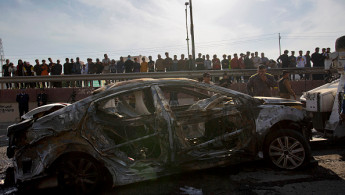Iraqi 'death squad', not IS, responsible for Basra motorcycle bombing, says official
A prominent Iraqi security official said that a motorcycle bombing in the city of Basra last week was the work of an unnamed "death squad" and not the Islamic State group, as was previously suspected.
The security official, who chose to remain anonymous, informed Al-Araby Al-Jadeed that the intended target of the attack - which left four civilians dead - was an intelligence officer in the ministry of interior.
The targeted official had been investigating the assassinations of civilian activists and journalists by armed militias during protests in Basra that took place in October 2019.
While IS had not claimed responsibility for the attack, Basra Governor Asaad Al-Edani told reporters on Tuesday that "the blast carries fingerprints of Daesh (Islamic State)".
Al-Araby Al-Jadeed has now learned that an investigation into the deadly bombing had obtained "important information" that ruled out IS' involvement.
The anonymous security official said the attack was carried out by a remote-controlled explosive device whose detonation was mistimed, killing civilian bystanders.
Nearby CCTV footage had assisted investigators in establishing the true perpetrators.
Iraqi Prime Minister, Mustafa Al-Kadhimi, who visited Basra in the aftermath of last week's attack, ordered a thorough investigation to find the perpetrators.
He told security leaders in the city that he would not be "dragged into confrontation" but that those responsible will be "dragged… to justice by law" and "a just punishment awaits them".
"The crime of killing our officers amounts to treason and betrayal, and the killing of our youth in cold blood is one of a series of crimes that are known to all," he added.
"Just as we arrested the killers of Hisham Al-Hashemi, Ahmed Abdelsamad and Safaa Ghali, we will bring these criminals, one by one, in front of the judiciary and the people to expose their crimes."
The leader of the Sadrist movement, Moqtada Sadr, described the attack as a "political explosion" in a statement on Twitter.
The Shia cleric stressed the need to "disband militias which abuse weapons under the banner of resistance or any other pretext".
The only solution to the current crisis is a "national majority government" he added, referring to elections earlier this year, which have been disputed by pro-Iran parties and militias. Sadr's party won the most seats in the vote.
Naeem Aboudi, leader of rival Shia political party and paramilitary group "League of the Righteousness", sought to distinguish between criminal groups and armed militias.
"You cannot equate a death squad with factions which carry arms to defend this country," he claimed in a televised statement.





 Follow the Middle East's top stories in English at The New Arab on Google News
Follow the Middle East's top stories in English at The New Arab on Google News


